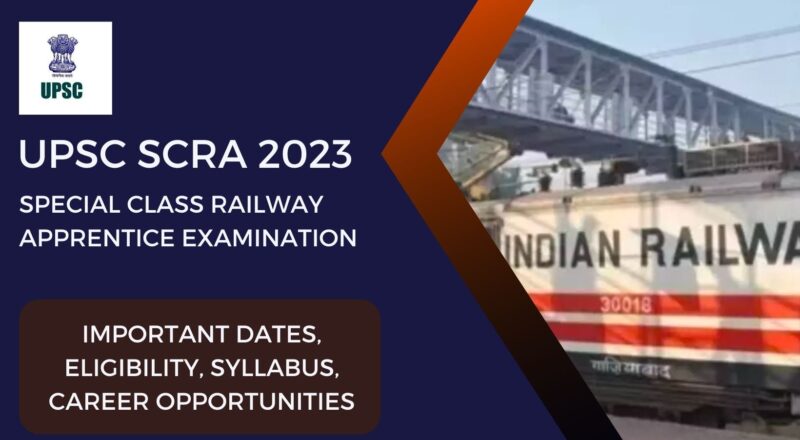Special Class Railway Apprentice Examination, UPSC SCRA 2023: Important Dates, Eligibility, Syllabus
The Special Class Railway Apprentice (SCRA) Examination, UPSC SCRA 2023 conducted by the Union Public Service Commission (UPSC), is a distinguished and sought-after examination in India. It serves as the gateway to a fulfilling and prestigious career in the Indian Railways, one of the largest and most vital organizations in the country.
Table of Contents
- A Glimpse into the SCRA Examination
- UPSC SCRA 2023: Important Dates
- UPSC SCRA 2023: Eligibility Criteria
- UPSC SCRA 2023: Examination Process
- UPSC SCRA 2023: Syllabus
- UPSC SCRA 2023: Career Opportunities
A Glimpse into the SCRA Examination
The SCRA examination has a rich history, dating back to 1927 when it was initiated as a scheme for selecting candidates for the mechanical engineering department of the Indian Railways. Over the years, it has evolved into a comprehensive examination that assesses candidates on various fronts, including their knowledge, aptitude, and technical prowess.
UPSC SCRA 2023: Important Dates
The Union Public Service Commission (UPSC) has not yet announced the important dates related to the Special Class Railway Apprentice (SCRA) Examination 2023. However, the following are the tentative dates for the examination:
- Release of notification: October 2023
- Online application start date: October 2023
- Online application last date: November 2023
- Written examination date: February 2024
The UPSC will release the official notification on its website, https://upsc.gov.in/. Candidates are advised to regularly check the UPSC website for updates on the SCRA Examination 2023.
UPSC SCRA 2023: Eligibility Criteria
To appear for the SCRA examination, candidates must meet the following eligibility criteria:
- Age: Candidates must be between 17 and 21 years of age as of January 1st of the examination year. Age relaxations apply to certain categories.
- Educational Qualifications: Candidates should have completed the Intermediate or an equivalent examination with Mathematics and at least one of the subjects Physics and Chemistry as subjects of the examination.
UPSC SCRA 2023: Examination Process
The SCRA examination consists of three stages:
- Written Examination: The written examination is divided into three papers – General Ability Test (GAT), Physical Sciences, and Mathematics. These papers test the candidates’ knowledge in various subjects.
- Interview: Candidates who pass the written examination are called for a personal interview. This interview assesses their suitability for the railway apprenticeship.
- Medical Examination: Successful candidates undergo a thorough medical examination to ensure they meet the physical and medical standards required for railway service.
UPSC SCRA 2023: Syllabus
The syllabus for the Special Class Railway Apprentice (SCRA) Examination is as follows:
Paper I: General Ability
- English Language: Comprehension, vocabulary, grammar, and usage.
- Reasoning: Logical reasoning, analytical reasoning, and decision making.
- General Knowledge: Current affairs, history, geography, economics, and science.
Paper II: Engineering Mathematics
- Calculus: Differential calculus, integral calculus, and vector calculus.
- Differential Equations: Ordinary differential equations and partial differential equations.
- Linear Algebra: Vectors, matrices, and linear transformations.
- Analytical Geometry: Two-dimensional geometry and three-dimensional geometry.
- Trigonometry: Plane trigonometry and spherical trigonometry.
UPSC SCRA 2023: Career Opportunities
Upon successful completion of the SCRA examination, candidates are appointed as Special Class Apprentices (SCAs) and are provided with rigorous training in various railway workshops. After the training period, they can assume pivotal roles in railway operations, maintenance, and innovation. Career avenues include:
- Mechanical Engineering: Overseeing maintenance and repair of locomotives, rolling stock, and other mechanical components.
- Electrical Engineering: Managing the electrical systems and infrastructure of the railways.
- Civil Engineering: Planning and maintaining railway infrastructure, including bridges, tracks, and stations.
- Traffic Services: Managing train schedules, operations, and ensuring safe and efficient railway transportation.
- Signal Services: Overseeing railway signaling systems to ensure safe train movements.
For more career articles, click here.
For more information, click here.

